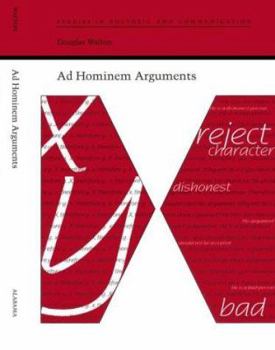Ad Hominem Arguments
(Part of the Studies in Rhetoric and Communication Series)
Select Format
Select Condition 
Book Overview
Essential to an understanding of argumentation and logic, Ad Hominem Arguments is a vital contribution to legal theory and media and civic discourse. In the 1860s, northern newspapers attacked Abraham Lincoln's policies by attacking his character, using the terms "drunk," "baboon," "too slow," "foolish," and "dishonest." Steadily on the increase in political argumentation since then, the argumentum ad hominem, or personal attack argument, has now been carefully refined as an instrument of "oppo tactics" and "going negative" by the public relations experts who craft political campaigns at the national level. In this definitive treatment of one of the most important concepts in argumentation theory and informal logic, Douglas Walton presents a normative framework for identifying and evaluating ad hominem or personal attack arguments. Personal attack arguments have often proved to be so effective, in election campaigns, for example, that even while condemning them, politicians have not stopped using them. In the media, in the courtroom, and in everyday confrontation, ad hominem arguments are easy to put forward as accusations, are difficult to refute, and often have an extremely powerful effect on persuading an audience. Walton gives a clear method for analyzing and evaluating cases of ad hominem arguments found in everyday argumentation. His analysis classifies the ad hominem argument into five clearly defined subtypes--abusive (direct), circumstantial, bias, "poisoning the well," and tu quoque ("you're just as bad") arguments--and gives methods for evaluating each type. Each subtype is given a well-defined form as a recognizable type of argument. The numerous case studies show in concrete terms many practical aspects of how to use textual evidence to identify and analyze fallacies and to evaluate argumentation as fallacious or not in particular cases.
Format:Hardcover
Language:English
ISBN:0817309225
ISBN13:9780817309220
Release Date:September 1998
Publisher:University Alabama Press
Length:240 Pages
Weight:1.45 lbs.
Dimensions:1.3" x 6.0" x 9.0"
Customer Reviews
0 rating





